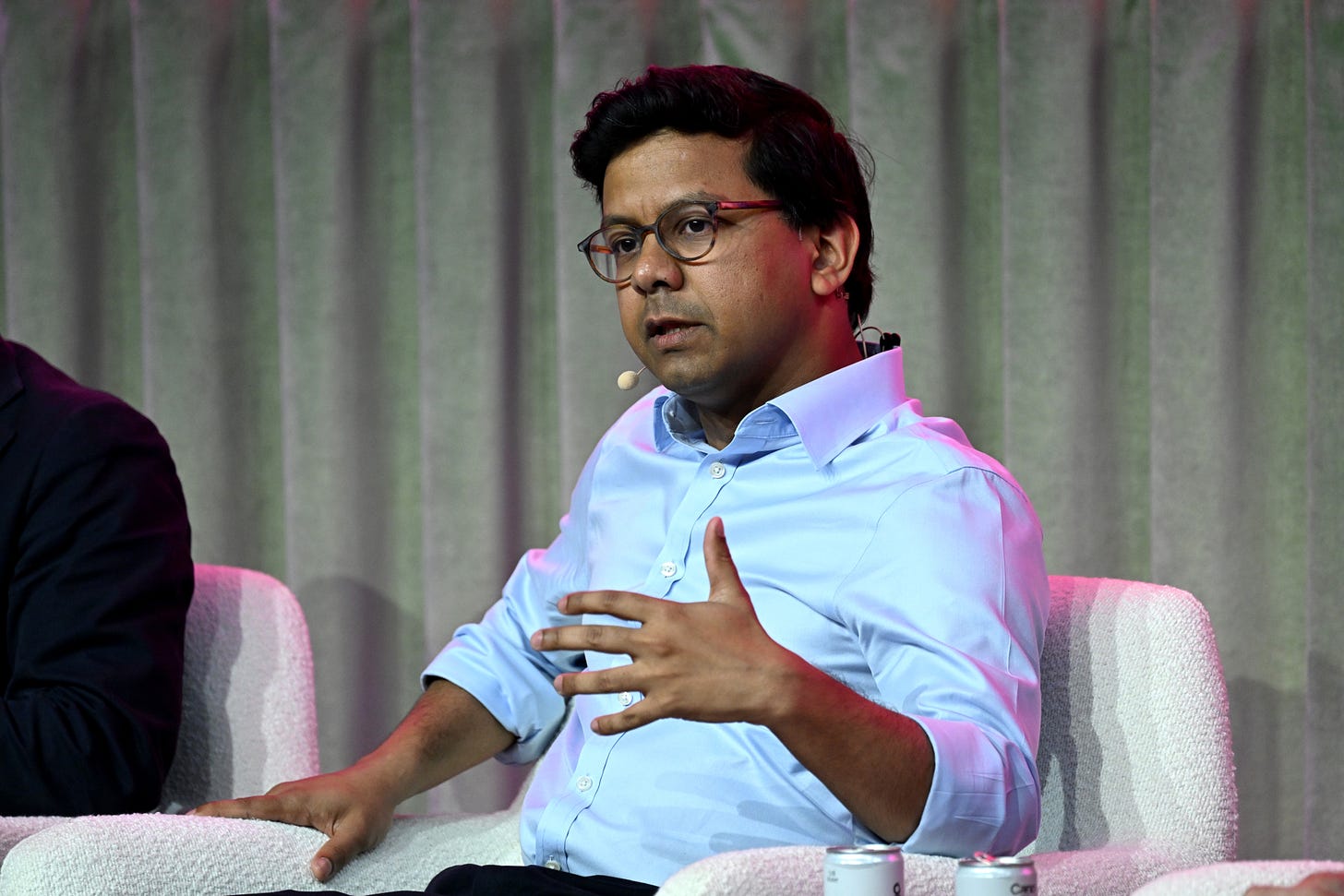Britain’s new AI minister actually ‘gets’ AI
Kanishka Narayan is excited about AI opportunities, but takes the risks seriously too
The typical British government minister does not always have the best grasp of their brief. In general, they are chosen for their political aptitude, not their experience.
Kanishka Narayan, the new junior minister with responsibility for AI and online safety, may be an exception. The 35-year-old former tech investor, who entered parliament just over a year ago, has already carved out a reputation as a tech-savvy, energetic presence. Now he’ll be bringing that experience to bear in the Department for Science, Innovation and Technology (DSIT) as it grapples with AI, including in the form of a forthcoming AI Bill.
“Ministers can take a lot of time to get up to speed with their portfolio,” Leo Ringer, founding partner at London-based Form Ventures and a former government adviser, tells Transformer. Not so with Narayan. He is “a minister whose understanding of his brief has been there from day one.”
‘Yes, and’ not ‘either or’
Narayan’s public remarks regarding AI have tended to focus on adoption and strategies for spreading potential benefits across the country. But he has acknowledged risks too, speaking at events covering risk and safety. At the AE Global Summit on Open Problems for AI late last year, he was careful not to dismiss catastrophic risks.
“Both in political terms and policy terms, the conversation about long-duration and catastrophic risk and shorter-duration and non-catastrophic but pretty material risks — our weighting across those has been changing,” he told an audience of researchers, business leaders and policy-makers. “I think for all of us who care about both sets of risks, it’s important that we also continue to have that conversation not in an ‘either or’ [way] but in a ‘yes, and’ way.”
Tommy Shaffer Shane, interim Director of AI Policy at the Centre for Long-Term Resilience, tells Transformer that he and Narayan have discussed the possible extreme risks of AI, such as loss of model control and misuse by bad actors, as well as second-order effects on geopolitics and everyday life.
“He is concerned, open-minded and wants to make time to engage with experts and people who are thinking about AI security, and I think that’s going to be part of what he spends a lot of his time as a minister doing,” he says, adding that they have also talked about opportunities to develop new technologies that get ahead of vulnerabilities caused or exacerbated by AI, for example, through investing in defensive acceleration to tackle potential harms such as pandemics or cyberattacks.
While certainly not a “doomer” himself, Narayan is intellectually familiar with AI safety arguments, and by all accounts understands the potential stakes. Through his staff, Narayan also has ties to the AI safety community: his head of office, Tom Blake, was a former fellow at Open Philanthropy, which is a major funder of organizations working on AI risks. (Disclosure: Open Philanthropy is the primary funder of Transformer.)
“He really gets AI”
As part of a record-sized deluge of 335 new MPs to arrive in Westminster last year, Narayan was just one of many looking to make a name for themselves. But in the space of a year, he has managed to do so in Whitehall and beyond.
“He really gets AI and already as a backbencher was very visible and engaged in serious thinking on how the government can support the AI sector, but also how the sector can support the rest of the economy, and stimulate massive investment and job growth,” says Ed Bithell, head of strategy and sovereign partnerships at London-based chip startup Fractile.
With help from a team of young policy advisers, Narayan has pushed projects that showcased his credentials as a politician who actually understood tech.
His “All Hands on Tech” campaign, launched earlier this year, tied his constituency work in the Vale of Glamorgan together with that specialty. Initiatives included training at top tech companies for young people and a local startup accelerator. He also released small side projects like KanishkaKloud, a dataviz tool he coded that allowed constituents to look up the words their representatives use most often in parliament. (Both are currently down while department officials ensure there is no conflict of interest with his new role).
With an optimistic and sometimes urgent tone, Narayan has frequently argued not only that the UK should take a leading role in the AI boom, but that it should ensure the benefits from this technological revolution are spread around the country.
“In the last wave of technology and software, a lot of the productivity impact felt very concentrated in specific areas: London, Silicon Valley,” he told me earlier this year. “I think this next wave — if we really want it to play the role we want it to, which is a role on productivity overall — it’s got to be much more widely shared.”
That’s not just wishful thinking but a realistic prospect in a technological revolution that will require both land and energy, he has argued. He has backed AI growth zones, the plan to create regional centres for innovation in places well-suited to hosting new data centres, which was first outlined in Matt Clifford’s AI Opportunities Action Plan, and advocated for bringing one to his own constituency.
Finance, tech and policy
Narayan’s approach may well reflect his background, which blends policy with time spent working in finance and tech.
Born in Bihar, India, Narayan moved with his family to Cardiff at the age of 12. After attending Eton College on a scholarship, he went on to study at the University of Oxford — reading Philosophy, Politics, and Economics, a course with a reputation for incubating future politicians. (Narayan’s cohort at Balliol College has become prominent in public life: classmates included fellow Labour MP Yuan Yang, economist and former DeepMind researcher Mike Webb, and Financial Times associate editor Stephen Bush.)
After graduation, he joined the civil service during the coalition government years, a period he has described as a “tumultuous time” which gave him an insight into both the state apparatus’ flaws and its “patchy instances of genius.” He left in 2016, working at investment bank Lazard for three years before doing an MBA at Stanford alongside working with Atomico, a VC firm. He then joined fintech investor Clocktower — but kept his hand in with policy, advising shadow cabinet members on Labour’s front benches as the party’s head of tech policy.
He was selected in early 2023 as the Labour candidate for the Vale of Glamorgan, a stretch of the south Welsh coast between Cardiff and Bridgend, winning it in 2024’s general election.
Inflection point
While Narayan’s new position gives him an opportunity to help shape the UK’s AI policy, overall responsibility for DSIT’s work falls to the incoming Secretary of State, Liz Kendall. Kendall’s predecessor, Peter Kyle, meanwhile, has signalled a desire to keep his hand in with AI after transferring to the Business and Trade department, appearing on stage with Nvidia boss Jensen Huang shortly after the reshuffle.
There are also questions as to how much influence Narayan will be able to wield as a junior minister. His predecessor, Feryal Clark, made little impression in the AI policy sphere and has now been shunted out of government. Insiders suspect things will be different with Narayan, who was seemingly chosen by Downing Street for the role because of his technical background and interest in the topic. With Kendall also appearing to be less interested in AI than other topics, Narayan may well be given room to meaningfully shape policy.
On the legislation side, all eyes are on a repeatedly delayed AI bill, which Kyle postponed, ostensibly in favour of building a more comprehensive package, but also, some suggest, because he wanted to avoid angering the Trump administration, which has spoken vocally against any attempts by foreign governments to regulate US tech companies. The industry now expects a consultation to open within the next few weeks that will inform revamped proposals.
Key to guiding that bill successfully through parliament will be addressing concerns raised by the creative sector over the use of copyrighted material in AI training. Backlash from campaigners and objections from lawmakers centred on that issue previously delayed a separate data bill which finally passed in June. The AI bill could open up that battlefield once again.
In the meantime, says Ringer, ministers may need to take steps to avoid a “mess”, in which different regulatory agencies end up making calls on how to govern AI without a unified approach.
“That’s not necessarily an argument for a bill,” says Ringer. “It’s an argument for a department like DSIT to say to regulators: are we thinking about this in a consistent and coordinated way?”
One potential issue is AI infrastructure, where DSIT is rumored to be feuding with Ed Miliband’s energy department over building out power infrastructure to support data centers. Narayan will also need to bring the public along with him: voters’ attitudes to AI are broadly negative, something insiders say Narayan is keen to get a grip on.
Narayan and his colleagues are not starting from scratch, but building on plans and projects set up in the first year of the government. “The UK is at a real inflection point, on how the government takes the ambition of the AI Opportunities Action Plan and the Compute Roadmap, and makes it reality through concrete initiatives,” notes Fractile’s Bithell.
“We’re really interested to see where Kanishka drives that, and how he makes sure the government’s resources are concentrated in the most impactful places, on the timescales that the moment demands.”





Excellent piece, thank you. A piece on the relationship between DSIT and DESNZ would be incredibly appreciated, thank you!